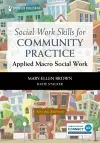
Social Work Skills for Community Practice
2 authors - Paperback
£71.09 was £78.99
Mary-Ellen Brown, MSW, MPA, LCSW, PhD, is an Associate Professor in the School of Social Work and the Founder/Director of the Office of Community Health, Engagement, and Resiliency at Arizona State University. Dr. Brown is also the Founder/Director of the national Center for Community Health and Resilience, a training and research center for Community Health Workers through SAMHSA's National Child Traumatic Stress Network. She is the chair of the Policy, Administration, and Community Practice Concentration Committee at ASU, and has over a decade of experience teaching macro social work courses including introductory macro practice, advanced community practice, program planning and evaluation, grant writing, administration, and leadership. Dr. Brown has been a community organizer, program manager, evaluator and researcher for nearly 20 years. She has a robust background in community health, positive youth development, nonprofit administration, and equitable, holistic place-based community development. Dr. Brown uses participatory action research to engage, mobilize, and strengthen or activate resilience in partnership with communities. Her scholarship has earned her recognition through several awards, including Social Worker of the Year (NASW-AZ, Branch II), the ACOSA Emerging Scholar Award (Association for Community Organization and Social Action), the Watts College Community Solutions Research Team Award and the ASU President's Medal for Social Embeddedness.
Katie Stalker, MSW, PhD, is an Associate Professor and the Director of Field Education at the University at Buffalo School of Social Work. Dr. Stalker is passionate about macro social work practice and education. Her research focuses on youth violence prevention across the adolescent social ecology (i.e., juvenile justice, school, family settings) and implementation science for community-centered prevention. In her line of research focused on community-centered prevention, Dr. Stalker uses a Community-Based Participatory Research approach in which she examines social problems and co-develops solutions in local contexts through partnerships with communities. In her role as Director of Field Education, she continues her community-based work by collaborating with agencies and organizations in order to develop rich field placement opportunities that provide students with the opportunity to apply their classroom learning into social work settings.